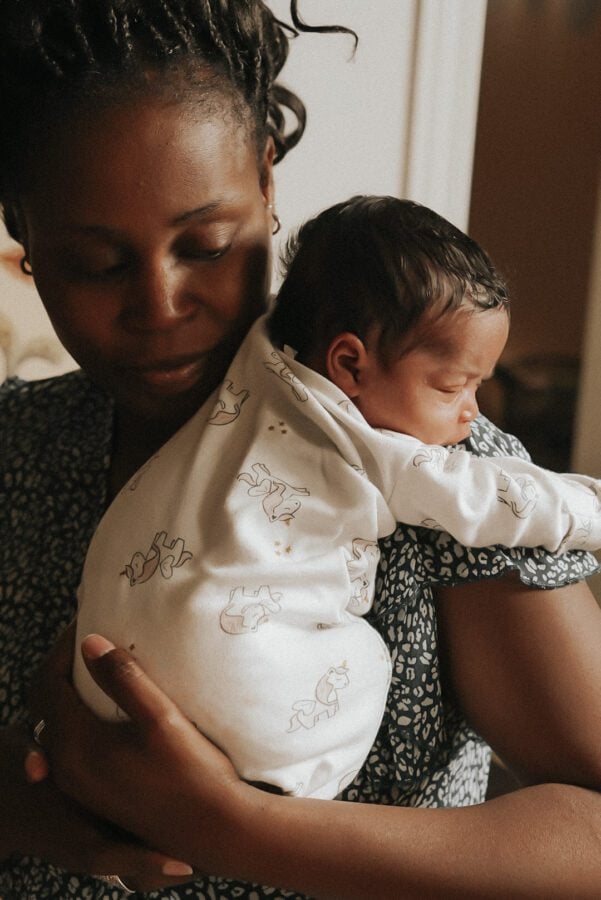It’s important to start by saying that crying or demands for feeding at night are related to the baby’s age. So consider this when reading the advice I provide below.
It’s normal that a baby wakes up at night to feed. If they have a regular pace during the day and night, they are hungry. Even if you try to give them more during the day, their stomach is not able to contain more. Like adults, a baby has a sleep and waking cycle. The frequency that they wake up at night depends on their needs but also their temperament. They can sleep calmly and then shift to a more troubled sleep where they move and cry without necessarily needing to feed. For many parents, you will see that after four months, the length of their sleep at night will increase for most babies.
However, some babies, especially after five months, wake up at night as a habit and not necessarily to feed. Around 6-12 months, the baby may also wake up to see if you are there. We call this an anxious phase due to the separation of the baby from their parents. How can you know if this is the case? It’s simple – if the baby feeds for a very short period and then falls asleep, you have your answer! They weren’t hungry. If they breastfeed well at night and not during the day, you also have your answer – their night schedule is during the day, and their daily schedule is at night. The mistake many parents make is to let their baby sleep more than four hours in a row during the day. You should wake them up softly and feed them so that they have the same night schedule as you do.
It can easily take up to five months for a baby to sleep five hours in a row without wanting to feed. While some babies will learn to sleep at night quickly, this is not the norm. You can’t prevent your baby from feeding because it’s a basic essential for their life. After five months, and based on their development, you can start introducing solid foods if their feeding periods are very close together over 24 hours. Dad can also try to give them water in a sippy cup or regular glass if they wake up at night. Don’t pick them up, leave them sitting in their crib. They slowly lay them back down while softly saying “dear baby, it’s night, time for sleep.” This procedure will help remove the need to feed, to be rocked and cuddled at night.
Many parents write to me to tell me that their baby has started to wake up at night after six, seven or eight months. This may be after they had a cold, earache, or the appearance of a first tooth. Even though the issue has passed, the baby continues to wake up at night. What can you do? At this age, they are brighter and are taking advantage of the privileges they had. They will continue to want your attention, your warmth, Mom or Dad’s smell when they rock them at night. They love that, so why would they want to stop?
Educational video from Marie
If you are sure that your baby is fine, that they are fed, with a clean diaper, and you feel you can take on the challenge of these crying fits, you can try the 5-10-15 technique. This technique involves saying to your baby “it’s time to go to bed my love, it’s nighttime” after the first five minutes of crying. Then wait! Wait 10 minutes and repeat. Ideally, Mom and Dad alternate. This way the baby is reassured that both of you are there, that you are ensuring their feeling of security while not necessarily going into their room, picking them up and rocking them. If they continue to cry after another 15 minutes, repeat, and so on every 15 minutes until they stop crying. Never go into the room in between because that will increase their anger. If you are firm and steady, it should work after 2-3 nights. However, if it hasn’t worked after night nights and you are fed up hearing them cry or are tired and want to bring them into your bed, or rock them, or feed them, YOU ARE TOAST! They will understand that you gave up and all your hard work will have been for naught.
- The best gift you can give your child is to say NO!
If you start this procedure, both parents need to be ready and support each other. Don’t give up, or you will have wasted your time. It’s better to stay up 2-3 nights rather than have to deal with the issue for months.
During a conference I attended, an eminent pediatrist said: “the best gift you can give your child is to say NO!” He said that in the context where a child that knows their acceptable limits feels more secure and will not try to go beyond them all the time. On the other hand, when the parents lack coherency, where discipline varies from day to day, where “no” becomes “yes,” babies (and young children) don’t know where the limits are and always try to reach them to feel better and secure. They will try to test their limits because their parents don’t set clear and firm ones.
So, parents, it’s your turn!
If you have things that helped your baby sleep better, write to me to share your experiences. It will likely benefit other parents that read my blog.
Talk soon,
Marie
The Baby Expert


